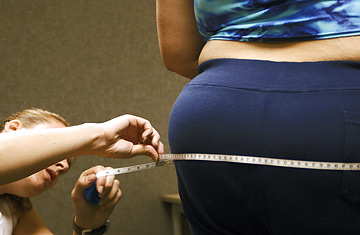
Doctor, firefighter, astronaut. These are the things kids want to be when they grow up. Obese 35-year-old with type 2 diabetes and coronary heart disease? Not exactly. But according to two studies published this week in the New England Journal of Medicine (NEJM), that's where our children are headed, unless monumental — and immediate — changes are made in the effort to curb childhood obesity.
"This is a public health problem, and public health problems require policies that actually reinforce positive choices," says Dr. Kirsten Bibbins-Domingo of the University of California, San Francisco, a principle author of one of the NEJM studies. "We know that healthy nutritious foods and physical activity are really the keys to preventing excessive weight gain in childhood. We need a concerted effort at the federal, state and local level — across government and industry — to ensure that those things are available to our children."
Those efforts are already overdue, according to the findings of Bibbins-Domingo's report. Extrapolating from childhood obesity rates from 2000, she and colleagues at San Francisco General Hospital and Columbia University, estimate that by 2020, as many as 44% of American women and 37% of men, at age 35, will be obese — obese and, therefore, ill. By 2020, "we found, not unexpectedly, that the prevalence of heart disease will rise by as much as 16%, and heart disease deaths by as much as 19% between the ages of 35 and 50 years," says Bibbins-Domingo. Estimating conservatively, that figure translates to about 100,000 additional heart disease deaths among 35-to-50-year-olds solely due to obesity. Realistically, says Bibbins-Domingo, the number is probably closer to 300,000.
The second, larger study in the NEJM came to similar conclusions. By comparing the childhood medical records and adulthood hospital records of 276,835 Danish citizens born between 1930 and 1976, researchers found a distinct correlation between higher childhood body mass index (BMI) — the ratio between height and weight that is the standard for defining obesity — and a greater risk of future heart disease and heart disease–related death. According to the authors, it is the first study to conclusively link excess weight in childhood and health problems later on. What's more, the data showed that the correlation is linear and progressive: as kids' BMI increased, their risk of adult heart disease rose alongside it. "We anticipated finding a threshold, or a cut point at which the risk dramatically increased or remained stable, so when it worked out to be such a proportional increase we were very surprised," says co-author Dr. Jennifer Baker, of the Center for Health and Society at the Institute of Preventive Medicine in Copenhagen. "The association we found is very straightforward, the higher a child's BMI in childhood from the ages of 7 to 13, the greater the risk of heart disease in adulthood. They increase in proportion to each other."
The risk increased not only with weight, but also with age. At seven, a girl of average height and weight (about 4 ft., 52 lbs.) had a 4.6 % chance of developing coronary heart disease in adulthood; the risk for that same girl, 10 lbs. heavier, jumped to 4.8%. At age 13, a healthy girl (5 ft. 2 in., 101 lbs.) had a 4.6% chance of developing heart disease as an adult, but at a higher BMI — the equivalent of adding about 28 lbs. — her risk of heart disease spiked to 5.7%. That amounts to an overall 24% higher risk of developing the disease.
In boys, the study found, the risks were even greater. At age seven, a healthy boy (about 4', 52 lbs.) had an 11.7% chance of later developing heart disease; with 8.6 lbs. of additional padding, that risk jumped to 12.9%. And at age 13, heavy boys — those with 24.7 lbs. of extra weight — showed a whopping 33% increased risk of developed coronary disease over their slimmer peers.
By U.S. standards — where some nine million children are overweight — the children included in the Danish paper would have barely made the cutoff for "overweight." Merely being chubby it seems — let alone obese — can be a serious health risk. "Our study shows that even a few excess pounds or kilograms of weight can damage future health," Baker says.
Baker did not have access to her subjects' adult weights, so she could not confirm whether their heart-disease risk was influenced by adult obesity, but her study did show that those risks weren't nearly as high in kids who started out heavy at age 7, but lost the weight by 13. "If we could intervene in that period to help these children attain and maintain an appropriate weight for their age, we really could significantly reduce the risk of heart disease in the future," says Baker.
Better yet, experts say, prevent that risk from ever climbing: keep children fit from the beginning. "If you're trying to prevent this problem, then you want to establish good food habits early. You want to keep children away from the food industry messages to eat unhealthy food. It could be that earlier years will be the best time to begin that education," says Dr. Kelly Brownell, director of the Rudd Center for Food Policy and Obesity at Yale.
As with most health problems, the key is prevention, and the effort cannot be left up to the individual — parents ought to be the first to take responsibility. Dismissing childhood obesity as baby fat or relying on a kid's will power is simply not a solution, says Baker. "We cannot consider it just to be a cosmetic problem. It's a health risk problem," she says. "We can no longer sit back and wait, and think a child may grow out of [it]."
